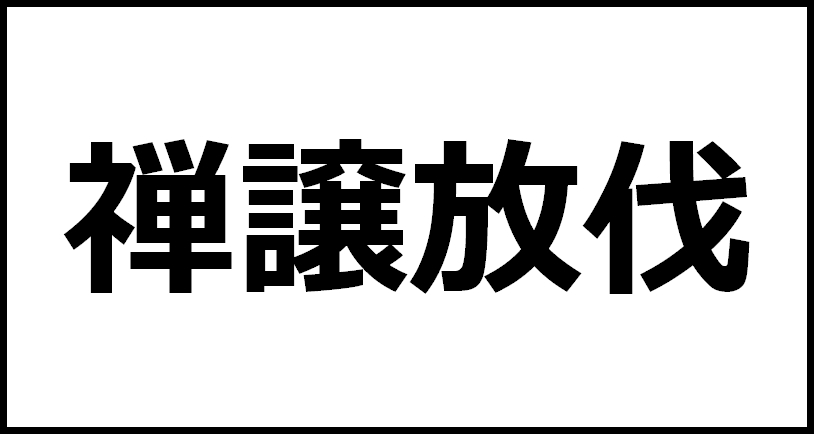禅譲放伐について。四字熟語の禅譲放伐の読み方や意味、英語や外国語での意味をまとめました。
禅譲放伐について
禅譲放伐の読み方・意味
| 四字熟語 | 禅譲放伐 |
| 読み方 | ぜんじょうほうばつ |
| カタカナ読み | ゼンジョウホウバツ |
| ローマ字読み | zenjohobatsu |
| 読みの文字数 | 9文字読みの四字熟語 |
| 頭文字 | 「ぜ」から始まる四字熟語 |
| 構成する文字 | ・伐 ・放 ・禅 ・譲 |
| 意味 | 古代中国で、王朝が交替するときの二つの方法のこと。中国の君主は,天帝の命によってその地位にあるものと信じられていた。禅譲は,1王朝1代で,前の王が天命の下りた天下の最有徳者に平和的に王位を譲るという理想型。夏の時代にいたって世襲制度になった。その世襲の王朝が交替する場合は、放伐(武力をもって討伐)がなされるようになった。 |
禅譲放伐の意味(外国語)
禅譲放伐の外国語での意味をまとめました。
| 英語 | The two ways in which dynasties changed hands in ancient China. Chinese monarchs were believed to hold their positions by order of the Emperor of Heaven. Zenjo is an ideal type in which the former king peacefully cedes the throne to the most virtuous person in the world, who has been given the mandate of heaven, in one dynasty. By the time of the summer, it had become a hereditary system. When the hereditary dynasty was replaced, hobatsu (subjugation by force) was carried out. |
| スペイン語 | Las dos formas en que las dinastías cambiaron de manos en la antigua China. Se creía que los monarcas chinos ocupaban sus cargos por orden del Emperador del Cielo. Zenjo es un tipo ideal en el que el antiguo rey cede pacíficamente el trono a la persona más virtuosa del mundo, a quien se le ha dado el mandato del cielo, en una dinastía. En el momento del verano, se había convertido en un sistema hereditario. Cuando se reemplazó la dinastía hereditaria, se llevó a cabo hobatsu (subyugación por la fuerza). |
| イタリア語 | I due modi in cui le dinastie passarono di mano nell’antica Cina. Si credeva che i monarchi cinesi mantenessero le loro posizioni per ordine dell’Imperatore del Cielo. Zenjo è un tipo ideale in cui l’ex re cede pacificamente il trono alla persona più virtuosa del mondo, a cui è stato dato il mandato del cielo, in una dinastia. Al tempo dell’estate, era diventato un sistema ereditario. Quando la dinastia ereditaria fu sostituita, fu eseguito l’hobatsu (sottomissione con la forza). |
| ポルトガル語 | As duas maneiras pelas quais as dinastias mudaram de mãos na China antiga. Acreditava-se que os monarcas chineses mantinham seus cargos por ordem do Imperador do Céu. Zenjo é um tipo ideal no qual o antigo rei cede pacificamente o trono à pessoa mais virtuosa do mundo, a quem foi dado o mandato do céu, em uma dinastia. Na época do verão, havia se tornado um sistema hereditário. Quando a dinastia hereditária foi substituída, o hobatsu (subjugação pela força) foi realizado. |
| フランス語 | I due modi in cui le dinastie passarono di mano nell’antica Cina. Si credeva che i monarchi cinesi mantenessero le loro posizioni per ordine dell’Imperatore del Cielo. Zenjo è un tipo ideale in cui l’ex re cede pacificamente il trono alla persona più virtuosa del mondo, a cui è stato dato il mandato del cielo, in una dinastia. Al tempo dell’estate, era diventato un sistema ereditario. Quando la dinastia ereditaria fu sostituita, fu eseguito l’hobatsu (sottomissione con la forza). |
| 中国語 | 中国古代更替的两种方式。 据信,中国君主是奉天帝之命担任职务的。 Zenjo是一个理想类型,其中先王在一个王朝中和平地将王位让给了世界上最有德行的人,他得到了天命。 到了夏天,就变成了世袭制。 更换世袭王朝时,进行了hobatsu(武力征服)。 |
| 韓国語 | 고대 중국에서 왕조가 교체될 때의 두 가지 방법. 중국의 군주는 천제의 생명으로 그 자리에 있는 것으로 믿어졌다. 선양은, 1왕조 1대로, 전의 왕이 천명이 내린 천하의 최유덕자에게 평화적으로 왕위를 양보한다고 하는 이상형. 여름 시대에 있어도 세습 제도가 되었다. 그 세습의 왕조가 교체하는 경우에는 방벌(무력으로 토벌)이 이루어지게 되었다. |


